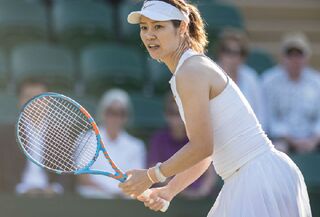李娜,一个退役体育巨星的影响力范本
|
WIMBLEDON, England — Four years after playing the last match of her career at Wimbledon, Li Na has returned to the All England Club. Her life has had additions; she brought her two children, Alisa, 3, and Sapa, 1?. But she is missing the kinesio tape that once constantly adorned her knee, and her trademark tan has faded to where one junior Chinese player said she initially did not recognize Li.
What has not receded is Li’s power as a symbol of success in China. On the court, two Chinese players inspired by Li, a two-time Grand Slam champion, have reached the semifinals of the girls’ singles competition, and another Chinese player is in the boys’ semifinals. Off-court, Li is still earning between $15 to $20 million annually through endorsement and licensing deals. “I think a lot of her sponsors were stressed out and scared when she retired — ‘How is this going to work?’” said Max Eisenbud, Li’s agent. “But I think now they secretly like it, because now they can have more time with her, and now she’s present in China.” He added that Li had “no competition” in China from other athletic superstars. Li, 36, has retained almost all her sponsors from during her playing career. Nike, whose Asian headquarters in Shanghai are named after her, has introduced a Li Na collection in China. Babolat is coming out with a racket named after her later this year. A menu is dedicated to her at the restaurant chain Element Fresh. Li is bolstering her own business bona fides by studying for an M.B.A. at a university in Beijing, where she now lives. “I just want to improve myself a little bit, and to meet different people,” Li said. “Since I start tennis at 8 years old, until I retired, I only met sports people. I wanted to meet different people, and see different things.” Although she is the same age as Serena Williams, Li never considered returning to tour as a mother as Williams has. “No chance,” she said. “For me, it’s very tough to find the balance between family and tennis. My daughter is 3, and I’ve only left her seven days in three years. I couldn’t imagine leaving her home. And if I brought her on tour, I couldn’t concentrate on the court, so it would be very tough.” Li, who has been married to her husband, Jiang Shan, for 12 years, said she believed that part of her influence has been making women see themselves more as individuals who can be successful on their own terms. “I think now the Chinese women are more confident, from not only myself, but also other stories,” Li said. “They see that women can do it. Before they’d see that women would stay in the home and maybe have a nice job. But now, so many women don’t marry, because they think that means sharing with men, and they just want to be themselves. They want to have their own personality.” Li also pointed to the swimmer Fu Yuanhui, whose expressiveness made her a social media sensation. Li’s own story will reach to a wider audience soon, because her autobiography, “My Life,” is being made into a movie, with production finishing this year. Much of “My Life” is devoted to her thoughts on the systematic training methods used when she was a child. Li, who hopes to open her own academy, said that making sure children are enjoying the sport they play should be paramount. “Especially now, so many athletes, you can see on their face that they don’t want to be here,” she said. “They should learn happiness, confidence and control.” Li’s influence on Chinese youth has already been massive, with countless young players inspired to try tennis because of her. Wang Xinyu — who has reached the girls’ semifinals along with the similarly named Wang Xiyu — was taught the game by her father, a tennis coach. Despite her family background in the sport, Wang, 16, said Li’s success was crucial to her reaching her potential. “It’s a motivation for us Chinese players to have somebody who has done that before, so you can have a dream,” Wang said. “Because before, we keep saying that maybe European players or American players are physically more strong, and mentally tough. We’re not sure that we can make it. But somebody made it, so now we have a goal.” Unlike Li, many of the most promising young Chinese players have trained with foreign coaches in their teenage years, which may accelerate their development and acclimatize them to the international nature of the sport. Wang Xinyu’s coach, Aleksandar Slovic, is Serbian; Zheng Qinwen, who reached the third round of the girls’ draw, is coached by the Argentine Carlos Rodriguez, who formerly coached Li and Justine Henin. Wu Yibing, who at the United States Open last year became the first boy from mainland China to win a Grand Slam junior title, recently began working with Sven Groeneveld, Maria Sharapova’s former coach from the Netherlands. Zheng, 15, lit up at the mention of Li’s name, saying she remembered watching Li win the 2014 Australian Open with her friends. “She’s an amazing player for me,” she said. “She changed tennis in China. Most people started tennis because Li Na was so good.” Zheng’s parents wanted her to take up a sport because she was “really weak and fat,” she said. They first wanted her to play table tennis, but she fell for tennis. “Tennis is really fun,” Zheng said. “Ping-Pong is so boring.” She seemed to be living out Li’s desire that Chinese children enjoy the sport they play. “When you are young, and you see something you like, there is no reason,” Zheng said. “You just like. And I go for it.” |









